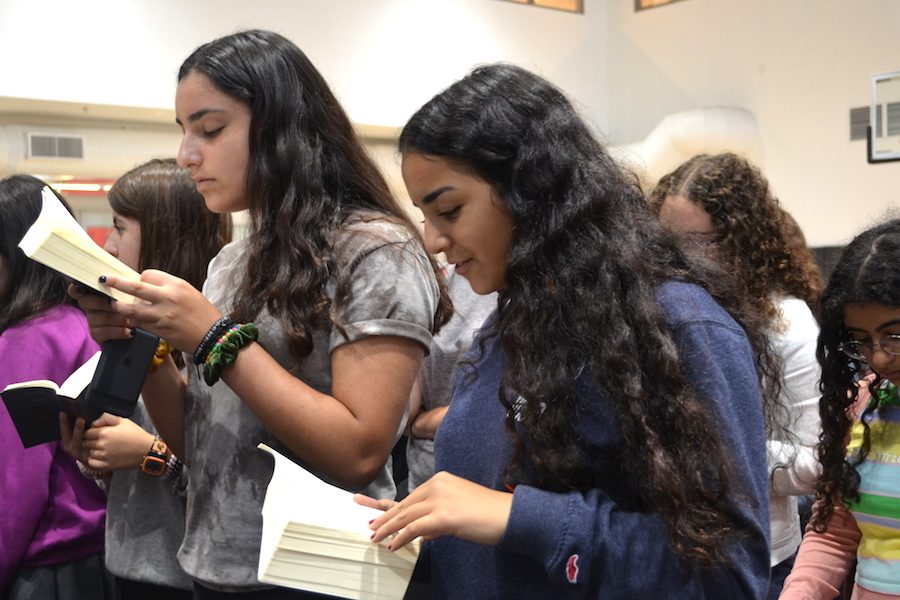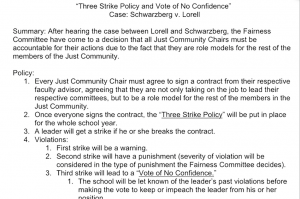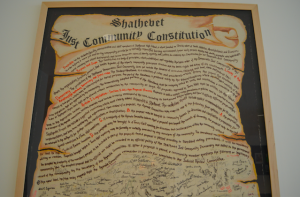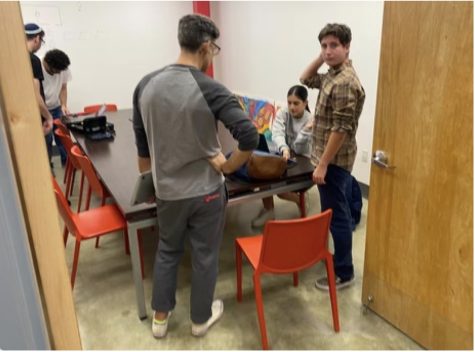Fairness imposes penalties for missing davening
TIGHTEN: Sophomores prayed during an all-school Shacharit in the gym. A new policy sets three levels of consequences for students who ditch.
In response to a greater number of students ditching davening (prayer) last year, the Fairness Committee wrote a stricter policy regarding davening attendance, and that policy will be continued indefinitely, according to Rabbi David Block, Assistant Principal Judaic Studies.
The policy, which was announced last spring by current Fairness chairs Jordana Glouberman and Jonathan Fishman, was discussed but not voted on at a Town Hall May 10. It mandates increasingly severe consequences each time a student is caught ditching davening, and punishments are greater if lying is involved.
“A number of students had been caught skipping davening and, when approached by faculty, were then being dishonest,” wrote the Fairness Committee in an email response to Boiling Point questions after the new policy was announced. “The Committee convened and proposed a remedy to this school-wide issue.”
The new policy is the first time the Fairness Committee has been formally asked to solve a schoolwide discipline problem with a policy not considered by the Just Community. Dress code, parking enforcement, administration discipline for off-campus behavior and other perennial issues have been the subject of Town Halls often since the founding of the school. Many have been resolved, at least temporarily, by student vote.
Last spring, however, administrators asked the Fairness Committee to work on the davening issue. Led by Fairness adviser Dr. Keith Harris, the committee announced its new policy at Town Hall, saying it had already been accepted by the administration. The policy is not posted in the online Student Handbook or on Schoology.
Under the new policy, if a student is caught skipping davening a first time and admits it, he or she receives a warning, and administration is notified.
“The administration is aware of that student until the end of the semester,” the policy states, according to Fairness’ email to the Boiling Point.
If a student caught the first time lies about it, or is caught for a second time, he or she receives an “out-of-school suspension that is not on the record and [must write] a reflection paper about what the Just Community means to the individual,” the email says.
The third time, the student receives an “out-of-school suspension that is on the record and [writes] a second reflection paper.” An out- of-school suspension on record is reported to colleges during the application process.
Other provisions state that students are allowed to contest their punishment; that cases will be deliberated by Fairness; and that students cannot be punished retroactively.
According to the Fairness Committee email, which was not signed by any one person, there have been no reported cases yet.
Dr. Jerry Friedman, who founded Shalhevet with the idea that it would allow students to make as many community decisions as possible, said that Town Hall, not the Fairness Committee was not meant to create policy.
“The Fairness Committee was to deal with individuals who came to the Fairness Committee feeling something was unjust,” said Dr. Friedman, who helped students write the school’s original Just Community Constitution in 2002.
“The rules and regulations come from the general community,” Dr. Friedman said in an interview. “That means the Town Hall, where it would be brought up in full with both sides expressing opinions and then coming to a vote. And that’s where the rules and regulations should come from. They should not be coming from the Fairness Committee.”
But current Fairness Committee leaders wrote last spring that it was their role as elected representatives to forge policy they believe to be beneficial to students.
“The Just Community is a representative government,” said the committee in its statement. “The Fairness Committee, as an arm of the Just Community, suggests policy based on the deliberations of the members of the committee. Additionally, the Committee considered the sense of immediacy of the situation when making its decisions.”
Agenda Chair Talia Gill disagreed.
“With as much respect to the Fairness Committee and recognizing that they are super important to the Just Community, I’ve never known Shalhevet to be a representative government,” said Talia. “I thought we were a school were democratic ideals.”
She said she would like to help come up with guidelines for Fairness making policies.
“I don’t blame them for making a policy out of the blue, because in Agenda we have very clear guidelines over how to pass a proposal,” said Talia. “We know that it has to go through Town Hall first.
“Fairness doesn’t have those guidelines. So I definitely would be in favor of instituting clear guidelines for how Fairness is supposed to get things done. But I don’t blame them for how they’re doing it now because they have no other direction.”

Jacob Joseph Lefkowitz Brooks was editor-in-chief during the 2019-20 school year and is now a student at the University of Toronto.














